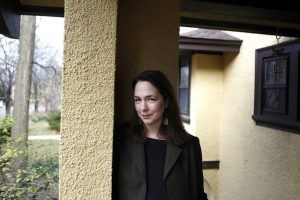Sarah Marshall in The New Republic:
 I first encountered Lorrie Moore when I read “How to Become a Writer,” a mesmerizingly bleak story from her 1985 debut collection, Self-Help, which I imagine to be so frequently anthologized because editors want something of hers and because the title is so appealing. Besides, it’s a promising one, suggesting a clear set of instructions. Like much of Self-Help, the story is voiced in second-person imperative, but it can only offer directions down a road to nowhere: “First,” its opening lines instruct, “try to be something, anything, else.”
I first encountered Lorrie Moore when I read “How to Become a Writer,” a mesmerizingly bleak story from her 1985 debut collection, Self-Help, which I imagine to be so frequently anthologized because editors want something of hers and because the title is so appealing. Besides, it’s a promising one, suggesting a clear set of instructions. Like much of Self-Help, the story is voiced in second-person imperative, but it can only offer directions down a road to nowhere: “First,” its opening lines instruct, “try to be something, anything, else.”
Did Lorrie Moore ever try to be anything else? Her collected nonfiction, in the newly-released See What Can Be Done, offers a few answers: some about Moore herself, and some about the intertwined joys and despairs of a writing life—and the futility, perhaps, of resisting one. As in her fiction—for which the vast majority of readers know her—Moore’s one-liners are tart, but never acid. “The clichés here,” she writes of James Cameron’s Titanic, “are sturdy to the point of eloquence.” Of George H.W. Bush in the 1992 election: “He was too proud to flirt.” She strikes the reader as someone who could silence a room with a few well-placed glances; the most withering thing she will say about the most ridiculous of passages is that it “gives one pause.” I was three-quarters of the way through this book before I realized—shocked, and then shocked at my shock—that it contains no hatchet jobs.
See What Can Be Done is mostly cultural criticism: a scabbard sheathing 34 years’ worth of American media, from Nora Ephron’s Heartburn to the 2016 election, but studded, here and there, with gem-dense personal essay. The most unsettling of all these is “One Hot Summer, or A Brief History of Time,” Moore’s essay on her own honeymoon, folded into a book that contains occasional tossed-over-the-shoulder references to male partners who alternately support and undermine women’s creative work. (Edna St. Vincent Millay, we learn, was married to “the stunning Eugen Boissevain,” who cooked her dinners and tried morphine to better understand his wife’s addiction and withdrawal.)
More here.
